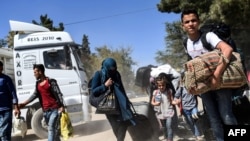Speaking with the American broadcaster ABC, Russia’s Deputy Foreign Minister Sergei Ryabkov claimed the “whole core, the essential element” of the Kremlin’s policy towards Syria is helping the Syrian people to make their own choices freely.
The Russian Foreign Ministry circulated Deputy Foreign Minister Sergei Ryabkov’s interview with ABC via the ministry’s social media accounts, and also posted a two-part video of the interview with Russian subtitles on the ministry’s official YouTube channel.
Ryabkov said the Syrian people “should decide for themselves what to do with their country” and that supporting their decision is “the whole core, the essential element of our policy towards Syria."
In fact, Russia’s actions in Syria are neither dictated by the desires of the Syrian people nor aimed at helping the country find a solution to a bloody civil war. On the contrary, Russia is assisting Bashar al-Assad’s regime militarily and politically, thereby disregarding the rights of a large part of the Syrian population.
“Ryabkov's statement couldn't be further from the truth,” Julia Davis, an investigative reporter who monitors Russian media, told Polyfraph.info in an email. “Russia is aggressively meddling in Syria, which it considers to be the battleground for asserting its greatness on the world's stage. Russia's priority is to prop up Assad - not because he is good for the Syrians, but solely because he is a reliable ally to the Russians and a foe to the West.”
Moscow’s support for the Assad regime is not a secret. Russia, a permanent United Nations Security Council member, has vetoed eight UNSC resolutions on Syria. Russia’s seventh veto, cast in February, was against a resolution imposing sanctions on the Assad regime. President Vladimir Putin called that UN resolution “totally inappropriate.”
In April, again because of a Russian veto, the UNSC failed to condemn the deadly April 4 chemical gas attack on Syrian civilians. Russia claimed that any such resolution would interfere with the UN-led peace negotiations between the warring sides in Syria.
“Looking at Russia's actions, it seems clear it has thrown its full weight behind the Syrian regime, ignoring the opinion of the millions of Syrians who protested and continue to protest against it when possible, and those who support the opposition,” Hossam Abouzahr, Associate Director at the Atlantic Council’s Rafik Hariri Center for the Middle East, wrote to Polygraph.info.
By blocking multiple UN resolutions, Abouzahr said, Russia is hindering the international community’s efforts to exert pressure “on the [Assad] regime to lift restrictions on freedom of expression, such as on the issue of arbitrary arrests and the estimated 150,000-200,000 individuals held in regime prisons.”
Experts told Polygraph.info that Russia supports the Assad regime more for its own reasons than for the benefit of the Syrian people. Besides, due to the complexity and diversity of the factions fighting in Syria, it is unclear who Ryabkov meant when he said “Syrians should decide for themselves what to do with their country.”
“The Syrian people rose up against Assad, which is at the core of the civil war that turned into a bloody massacre, due to Assad's unwillingness to relinquish his power,” said Julia Davis. “The needs of the Syrian people are the last on Russia's agenda.”
A “convenient delaying tactic in negotiations” might be part of Russia’s calculations, Abouzahr said, adding that this “absolves Russia of any real responsibility for finding a solution.” And, since the Assad regime seems encouraged by the support it is getting from the Kremlin, it is able to “prevent any negotiated settlement from taking place,” he said. Thus, a protracted civil war is mutually beneficial for both sides of the Russia-Syria alliance.
In January, Moscow signed an agreement with Damascus that allows Russia to almost double its presence at the Tartus naval base and which extended the lease for the base for the next 49 years (automatically renewable for an additional 25 years). The agreement also covers an air base near Latakia. This development gives Russia the ability to deploy forces in Syria for the next half-century, if not longer.
“This clearly shows that Russia is there to stay,” said Davis. “Assad's hold on power will be cemented by Russia's continued military presence. This environment is hardly conducive to the right of the Syrians to choose their leader.”
"The Syrians should decide for themselves what to do with their country... and that's the whole core, the essential element of our policy towards Syria."
False
Claim is contrary to Russia’s real objectives





